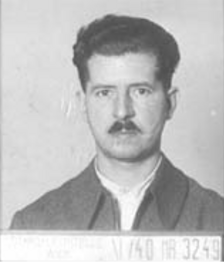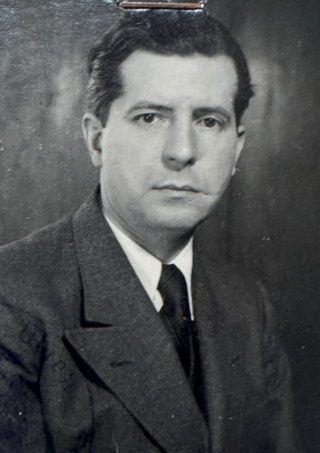Hofrat Dr. Heinrich Georg Peter Dürmayer

Personalia
Born:
Died:
Profession:
Persecution:
Imprisonment 04.09.1940 - 16.03.1942,
Flossenbürg concentration camp 16.03.1942 - 06.01.1944,
Auschwitz concentration camp 06.01.1944 - 25.01.1945,
Mauthausen concentration camp 25.01.1945 - 05.05.1945
KZ Number:
Memberships
Curriculum Vitae
Heinrich Georg Peter Dürmayer was born the legitimate son of master locksmith Peter Dürmayer and Karoline, née Maliwanek. After attending elementary school and grammar school, he enrolled in law at the University of Vienna. From his student days, he was already a convinced communist, but first became a member of the SDAP [today: SPÖ]. In 1926, he joins the student fraternity Marchia Wien. He graduated in 1930 and embarked on a career as a lawyer. In 1933, he left the student association Marchia Wien.
In 1934, Heinrich Dürmayer took part in the socialist February Uprisings as a member of the paramilitary Schutzbund and was arrested for this from February 13, 1934 to February 14, 1934. At the end of 1934, he leaves the SDAP and joins the KPÖ
After spending time in Paris and London, Heinrich Dürmayer fought in the International Brigades against Francisco Franco in the Spanish Civil War from January 1937, where he was promoted to Major. During his time with the International Brigades, he was active as a journalist and wrote reports for front newspapers, among other things.
His wife Renée Dürmayer, née Renate Lelewer, followed him from England to Spain in February 1937. She works as a pharmacist in the central pharmacy of the International Brigades in Albacete.
After the defeat of the Republicans, he flees to France, where he is interned in France on February 8, 1939 and held in the detention camps Saint-Cyprien, Gurs and Le Vernet.
After France's capitulation, he is handed over to the Gestapo on September 4, 1940, which takes him to Vienna via detention centres in Kehl, Karlsruhe and Ingolstadt. On March 16, 1942, he was finally deported to the Flossenbürg concentration camp. He was deployed in the quarry there for nine months. In Flossenbürg concentration camp, he was a member of the camp resistance around Karl Fugger.
On January 6, 1944, he was transferred from there to Auschwitz concentration camp

On January 25, 1945, when the Red Army was about to enter the concentration camp, he was taken to Mauthausen concentration camp. In the Mauthausen concentration camp, he once again held a leading position in the camp resistance as President of the International Committee. After the withdrawal of the camp SS from the main camp of the Mauthausen concentration camp by May 3, 1945, the International Camp Committee took over the management of the camp. The Committee's main task after the withdrawal of the SS was to ensure that the prisoners were supplied with food. On May 4, 1945 - one day before the liberation of the Mauthausen concentration camp - Heinrich Dürmayer officially became the last camp elder.
On May 16, 1945, shortly after the liberation of the Mauthausen concentration camp, Heinrich Dürmayer read out the so-called 'Mauthausen Oath' on behalf of the International Committee on behalf of all former political Mauthausen prisoners.
After the liberation of Austria, Heinrich Dürmayer was naturalized again in May 1945 and immediately commissioned by the State Secretary for the Interior of the Renner Provisional Government, KPÖ leader Franz Honner, to set up and head a new and unencumbered state police force. As head of the state police - formally the State Police Office of the Federal Police Directorate Vienna - he was also in charge of the department for investigating war criminals.
As head of the state police, he pushed for the recruitment of Communists, which led to around 90 percent of employees being members of the Communist Party. The state police under Heinrich Dürmayer's leadership ran the risk of becoming a "state within the state", as it largely eluded the influence of the Vienna Police Directorate and questioned the authority of the government by acting outside of Austrian law.
In September 1947, he was dismissed from his position and retired from the police service. [Note: The SPÖ-affiliated political scientist Norbert Leser later said that Heinrich Dürmayer would have "become a little Berija" if the Communists had come to power in Austria.]
Heinrich Dürmayer subsequently became a lawyer and legal advisor to the Communist Party again. As a lawyer and staunch communist, he retired.
More than 50 years after leaving, Heinrich Dürmayer was readmitted to the Marchia student fraternity in November 1988.
He died in Vienna at the age of 95 and was laid to rest at Vienna's Central Cemetery.
Places
Residence:
Persecution:
Citations
Wiener Stadt- und Landesarchiv (WStLA)
Dokumentationsarchiv des österreichischen Widerstands (DÖW)
Wikipedia unter de.wikipedia.org/wiki/Heinrich_Dürmayer
Homepage Studentenverbindung Marchia unter www.corps-marchia.at
Matricula Online
Friedhöfe Wien - Verstorbenensuche
